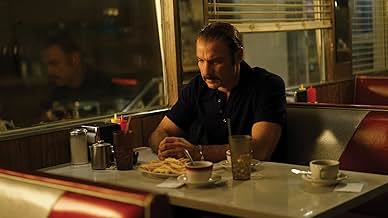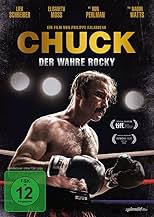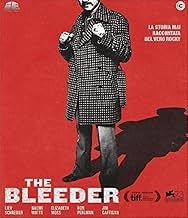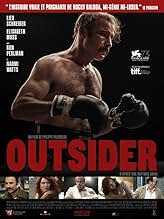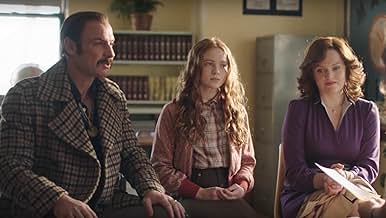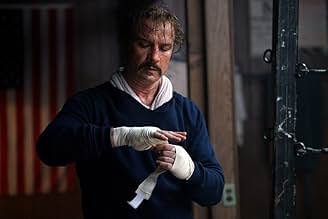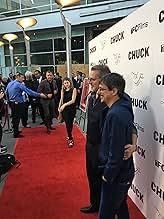AVALIAÇÃO DA IMDb
6,5/10
7,2 mil
SUA AVALIAÇÃO
Um drama inspirado na vida do boxeador de pesos pesados Chuck Wepner, que teve uma luta única na vida com Muhammad Ali que iria inspirar o filme Rocky.Um drama inspirado na vida do boxeador de pesos pesados Chuck Wepner, que teve uma luta única na vida com Muhammad Ali que iria inspirar o filme Rocky.Um drama inspirado na vida do boxeador de pesos pesados Chuck Wepner, que teve uma luta única na vida com Muhammad Ali que iria inspirar o filme Rocky.
- Direção
- Roteiristas
- Artistas
Avaliações em destaque
Always good to see Ray Donovan and never more so than in this true story that inspired the Rocky movies.
Well put together movie with a well time narration throughout, they done a great job with setting this film in the 70's
Nice easy watch and very well filmed I thought the narration worked perfect with what was happening, solid acting and a good choice of cast,
I found the story really interesting even though I know the outcome of the Ali fight I was still cheering Chuck on.
Well put together movie with a well time narration throughout, they done a great job with setting this film in the 70's
Nice easy watch and very well filmed I thought the narration worked perfect with what was happening, solid acting and a good choice of cast,
I found the story really interesting even though I know the outcome of the Ali fight I was still cheering Chuck on.
Sylvester Stallone has denied that his character of Rocky Balboa was inspired by heavyweight boxer Chuck Wepner, who fought professionally from 1964 to 1978. Well, let's just take a look at some of what happens in the "Rocky" movies, shall we? In the original "Rocky" (1976), an unknown white boxer was plucked from obscurity and given a shot at the heavyweight title by a flamboyant black champion. No one gave Chuck, er, I mean, no one gave "Rocky" much of a chance, but he trained hard (old-school) and greatly exceeded expectations during the fight. In "Rocky III" (1982), Rocky gets in the boxing ring for a match against a hulking professional wrestler and, at one point, the wrestler picks Rocky up and drops him to the ground outside the ropes. In "Rocky IV" (1985), Rocky watched James Brown sing from inside the ring before a match. In the career of what real life boxer did all those things happen? Chuck Wepner. Who wrote and starred in all six "Rocky" movies? Sylvester Stallone. It's no wonder that Wepner called himself "the real Rocky". Likewise, it's no wonder that the bio-pic dramedy "Chuck" (R, 1:38) was made to tell Wepner's story. I could say more about the details in common between the careers of Rocky and Chuck, but trying to avoid spoilers (in case you don't know Chuck's story), I'll just refer you to something Chuck says in the movie: "You don't know me. Well, you know me, but you don't know you know me." It's worth mentioning up front that this isn't the story of the making of "Rocky". "Chuck" is about Chuck. The release of "Rocky" changed Chuck's life, but he was the same person before, during and after his proverbial 15 minutes of fame. Chuck worked as a liquor distributor to pay the bills. He was a boxer because it was what he did best. He wasn't the quickest, strongest or most successful heavyweight of his day, but he could take a punch. In fact, he could take a whole lot of punches (a beating, really) and keep coming back for more. They called him the Bayonne Bleeder. He hated the name, but he loved the fame. Chuck enjoyed being recognized and treated special – especially by the ladies. Never mind that he had a devoted wife, Phyliss (Elisabeth Moss), and a loving daughter, Kimberly (Sadie Sink), back home
growing increasingly frustrated by the selfish and neglectful way that Chuck was treating them.
Chuck's life changed forever in 1975. After Muhammad Ali took the world heavyweight title from George Foreman in the fight known as "the Rumble in the Jungle", Ali said he wanted to fight "a white guy". Since Chuck was the only white guy among the top 10 ranked heavyweight boxers in the world, his manager (Ron Perlman) took care of the details and Chuck Wepner, little known outside of New Jersey, got a shot at the title. For this first time in his career, he trained full time for this fight which took place near Cleveland, OH. Chuck's performance against Ali (Pooch Hall) increased his celebrity greatly. Then he became even more famous the following year when the new movie "Rocky" seemed to mirror his life, especially regarding the Ali fight. As Chuck tried to take advantage of being the guy who inspired the 1976 Best Picture Oscar winner by reaching out to Sylvester Stallone himself, Chuck was also increasing his selfish behaviors, using cocaine and pursuing even more women, including a local bartender named Linda (Naomi Watts), who didn't want anything to do with him a sentiment now shared by Phyliss.
"Chuck" is a very entertaining and long-overdue movie. Chuck Wepner's story is indeed the stuff of Hollywood – in the "Rocky" movies – and in this movie which reveals Chuck's story to be as interesting as Rocky's. This film had four writers whose combined efforts really do the story justice. They are Jeff Feuerzeig (known mainly for writing and directing documentaries including "The Real Rocky" for ESPN), Jerry Stahl (mainly a TV show writer, he also wrote 2003's "Bad Boys II"), Michael Cristofer ("Original Sin", "Bonfire of the Vanities", "The Witches of Eastwick") and Live Schreiber, who, besides being the film's star and co-writer, also helped produce. The screenplay focuses on the drama, but has an effective and organic humor about it. In the hands of director Philippe Falardeau (who directed Reese Witherspoon's 2014 film "The Good Lie"), and in the practically perfect performance of Schreiber, this film portrays the most eventful decade of Chuck's life without judgment, showing his highs and his lows, and never loses sight of his humanity. Another quote from the movie sums it up nicely: "Sometimes life is like a movie. And sometimes it's better." This film is better than most. "A-"
Chuck's life changed forever in 1975. After Muhammad Ali took the world heavyweight title from George Foreman in the fight known as "the Rumble in the Jungle", Ali said he wanted to fight "a white guy". Since Chuck was the only white guy among the top 10 ranked heavyweight boxers in the world, his manager (Ron Perlman) took care of the details and Chuck Wepner, little known outside of New Jersey, got a shot at the title. For this first time in his career, he trained full time for this fight which took place near Cleveland, OH. Chuck's performance against Ali (Pooch Hall) increased his celebrity greatly. Then he became even more famous the following year when the new movie "Rocky" seemed to mirror his life, especially regarding the Ali fight. As Chuck tried to take advantage of being the guy who inspired the 1976 Best Picture Oscar winner by reaching out to Sylvester Stallone himself, Chuck was also increasing his selfish behaviors, using cocaine and pursuing even more women, including a local bartender named Linda (Naomi Watts), who didn't want anything to do with him a sentiment now shared by Phyliss.
"Chuck" is a very entertaining and long-overdue movie. Chuck Wepner's story is indeed the stuff of Hollywood – in the "Rocky" movies – and in this movie which reveals Chuck's story to be as interesting as Rocky's. This film had four writers whose combined efforts really do the story justice. They are Jeff Feuerzeig (known mainly for writing and directing documentaries including "The Real Rocky" for ESPN), Jerry Stahl (mainly a TV show writer, he also wrote 2003's "Bad Boys II"), Michael Cristofer ("Original Sin", "Bonfire of the Vanities", "The Witches of Eastwick") and Live Schreiber, who, besides being the film's star and co-writer, also helped produce. The screenplay focuses on the drama, but has an effective and organic humor about it. In the hands of director Philippe Falardeau (who directed Reese Witherspoon's 2014 film "The Good Lie"), and in the practically perfect performance of Schreiber, this film portrays the most eventful decade of Chuck's life without judgment, showing his highs and his lows, and never loses sight of his humanity. Another quote from the movie sums it up nicely: "Sometimes life is like a movie. And sometimes it's better." This film is better than most. "A-"
This is a really good film. It's based on the true story that inspired Sylvester Stallone's Rocky movie. It has everything you want, every single actor is perfect in every way. I didn't know who was in it when I started watching and the well known actors revealed along the way sometimes took a minute or two before you knew who they were. Every single frame of this was well done. Highly recommended for folks who like paced movies about extraordinary 'normal' people. Lots of reunioning big and small screen actors came together to make this.
Philippe Falardeau, the acclaimed director of The Good Lie and the Oscar nominated Monsieur Lazhar comes forth with a period piece of New Jersey in the 1970's with a new film, The Bleeder, a drama, starring Liev Schreiber, known for his television role as Ray Donovan in the series "Ray Donovan," and as Marty Baron in last year's Oscar-winning Best Picture, Spotlight. Schreiber portrays boxer Chuck Wepner, the heavyweight champion of New Jersey, and often known more colorfully as the Bayonne Bleeder.
When he wasn't in the ring, Wepner was a liquor salesman on the mean streets of New Jersey who managed to last 15 rounds in a professional boxing match with the greatest fighter of all-time – Muhammad Ali. Legendary boxing promoter Don King wanted a race fight and sought out a white fighter to get into the ring with the Champ, Muhammad Ali.
Wepner seemed to be a good choice to be Ali's punching bag. Wepner had a reputation for being able to take a punch. And, true to King's intention, Wepner took a beating. Not as though it was anything new for Wepner. In his ten years as a boxer he had his nose broken eight times, had 133 stitches, suffered fourteen losses and two knockouts. He was once pummeled so badly by Sonny Liston suffering both a broken nose and a broken cheekbone that required extensive stitching to heal.
Yet, Wepner had managed to put together a string of good fights and began to believe and have faith that his dream of getting a title shot was in reach. While not a great fighter, Wepner was known for his big heart, his ability to take a beating and come back for more. As a matter of record, Wepner became the first man to knock Ali off his feet inside the ring during a title fight. A furious Ali got back up and pulverized Wepner without mercy culminating in the fight ending 19 seconds into the 15th round. Sylvester Stallone based his Rocky franchise on Wepner's life.
Director Falardeau exquisitely turns what might easily have been another boxing movie into a relationship piece illuminating Wepner's most difficult moments outside the ring. He depicts the 1970's much like Martin Scorcese's Taxi Driver – seedy, wild women, drugs, booze – along with exceptional highs and disastrous lows.
After Rocky became the hit of 1976 garnering ten Oscar nominations and three wins for Best Picture, Best Director and for Best Editing, Wepner began letting the world of New Jersey nightlife know he was the real life Rocky and to many he was. Jim Gaffigan plays, John Stoehr, Wepner's best friend and loyal steward who is shown as mostly living vicariously through Chuck. A most telling scene occurs when Cinematographer Nicolas Bolduc takes the audience down inside the clubbing world of the honky-tonk, disco era of the 1970's with the fur coats, gold chains, silky rayon tops, sequined gowns, costume jewelry and the dance music of the Bee Gee's. Here Wepner not only succumbs to the temptation of the drugs, booze and casual sex, he ultimately seems to confuse his own life with the screen life of Rocky Balboa as John looks on in giddy bewilderment.
Soon Wepner decides to confronts Stallone about Rocky. Stallone, played by Morgan Spector, seems genuinely flattered and invites Wepner to audition for a real-life role in Rocky II. A drug infused, boozed up Wepner, blows the audition as his life is now in a virulent downward spiral. Finally, after he shows up late and misses his 2nd grade daughter's Parents Day, his wife, Phyllis, played by Elisabeth Moss calls it quits. Wepner knows he's falling. Yet, he finds a glimpse of hope with a local bartender, Linda, played by Schreiber's real-life wife, Naomi Watts. The two hit it off with some playful banter before the bottom drops out for Wepner and he's sent to prison for drug trafficking. This becomes Stallone's impetus for his 1989 film Lock Up. Wepner is called upon to be a consultant and is shown in shackles and prison garb. Yet, when he sees Stallone staging the story, he realizes his life is not Stallone's version. This is the turning point of the film and for Chuck Wepner. He reconciles with his brother John, played sharply by Michael Rappaport and eventually marries Linda and the two spend the rest of their lives together in close relationship.
The Bleeder, full of rich costuming and fine cinematography, is at its core a period piece of the 1970's including the role boxing played in the public domain. In addition, it is also a strong narrative of the trials and tribulations of Chuck Wepner's life. It's a life affirming story as Wepner goes the distance and gets the girl in the end. Warmly recommended.
When he wasn't in the ring, Wepner was a liquor salesman on the mean streets of New Jersey who managed to last 15 rounds in a professional boxing match with the greatest fighter of all-time – Muhammad Ali. Legendary boxing promoter Don King wanted a race fight and sought out a white fighter to get into the ring with the Champ, Muhammad Ali.
Wepner seemed to be a good choice to be Ali's punching bag. Wepner had a reputation for being able to take a punch. And, true to King's intention, Wepner took a beating. Not as though it was anything new for Wepner. In his ten years as a boxer he had his nose broken eight times, had 133 stitches, suffered fourteen losses and two knockouts. He was once pummeled so badly by Sonny Liston suffering both a broken nose and a broken cheekbone that required extensive stitching to heal.
Yet, Wepner had managed to put together a string of good fights and began to believe and have faith that his dream of getting a title shot was in reach. While not a great fighter, Wepner was known for his big heart, his ability to take a beating and come back for more. As a matter of record, Wepner became the first man to knock Ali off his feet inside the ring during a title fight. A furious Ali got back up and pulverized Wepner without mercy culminating in the fight ending 19 seconds into the 15th round. Sylvester Stallone based his Rocky franchise on Wepner's life.
Director Falardeau exquisitely turns what might easily have been another boxing movie into a relationship piece illuminating Wepner's most difficult moments outside the ring. He depicts the 1970's much like Martin Scorcese's Taxi Driver – seedy, wild women, drugs, booze – along with exceptional highs and disastrous lows.
After Rocky became the hit of 1976 garnering ten Oscar nominations and three wins for Best Picture, Best Director and for Best Editing, Wepner began letting the world of New Jersey nightlife know he was the real life Rocky and to many he was. Jim Gaffigan plays, John Stoehr, Wepner's best friend and loyal steward who is shown as mostly living vicariously through Chuck. A most telling scene occurs when Cinematographer Nicolas Bolduc takes the audience down inside the clubbing world of the honky-tonk, disco era of the 1970's with the fur coats, gold chains, silky rayon tops, sequined gowns, costume jewelry and the dance music of the Bee Gee's. Here Wepner not only succumbs to the temptation of the drugs, booze and casual sex, he ultimately seems to confuse his own life with the screen life of Rocky Balboa as John looks on in giddy bewilderment.
Soon Wepner decides to confronts Stallone about Rocky. Stallone, played by Morgan Spector, seems genuinely flattered and invites Wepner to audition for a real-life role in Rocky II. A drug infused, boozed up Wepner, blows the audition as his life is now in a virulent downward spiral. Finally, after he shows up late and misses his 2nd grade daughter's Parents Day, his wife, Phyllis, played by Elisabeth Moss calls it quits. Wepner knows he's falling. Yet, he finds a glimpse of hope with a local bartender, Linda, played by Schreiber's real-life wife, Naomi Watts. The two hit it off with some playful banter before the bottom drops out for Wepner and he's sent to prison for drug trafficking. This becomes Stallone's impetus for his 1989 film Lock Up. Wepner is called upon to be a consultant and is shown in shackles and prison garb. Yet, when he sees Stallone staging the story, he realizes his life is not Stallone's version. This is the turning point of the film and for Chuck Wepner. He reconciles with his brother John, played sharply by Michael Rappaport and eventually marries Linda and the two spend the rest of their lives together in close relationship.
The Bleeder, full of rich costuming and fine cinematography, is at its core a period piece of the 1970's including the role boxing played in the public domain. In addition, it is also a strong narrative of the trials and tribulations of Chuck Wepner's life. It's a life affirming story as Wepner goes the distance and gets the girl in the end. Warmly recommended.
Chuck Wepner is not my idea of a recommendable character but CHUCK, the film, manages to keep a steady, neutral position, and not make any judgments about his nature. It just shows Wepner as someone easily impressionable and immature, but who, in the ring, is determined to go the distance, come hell or Muhammad Ali.
Clearly, his marriage to Phyllis was an error and having a daughter even more so because Wepner was completely absorbed in his boxing exploits, his side jobs, his sexual conquests and, ultimately, his identification with the tragic role played by Anthony Quinn in REQUIEM FOR A HEAVYWEIGHT, to the point of knowing his lines off by heart and feeling that he shares something with that unfortunate soul; and his fascination with the film, ROCKY, and its central character and rising movie star Sylvester Stallone, to the point of celebrating that film's Best Picture and Best Director awards as if they were his own, and of almost making Balboa his alter ego, all reflect his scattered personality and weakness of purpose.
That fascination with a celluloid, larger than life, hero also causes him to jump the boundaries of safe life into the dangers of drug addiction. I find the film brutally honest about that and about his break-up with his wife, played with considerable aplomb and force by Elisabeth Moss, as someone who refuses to be duped by the fake world of boxing, movies, and other illusions entertained by Wepner.
The scene where Schreiber (Wepner) goes to his daughter's school and completely misses the plot, partly because he is under the influence of drugs, is a classic in its simplicity, truth, and quality of acting by all involved.
Wepner's honesty about his boxing limitations is a point in his favor, and one that allows the viewer to develop some sympathy for the man.
I also found the Wepner-Stallone relationship very effectively and succinctly observed. Clearly, in real life Stallone is not the good guy that Balboa was. Stallone did nothing to assist Wepner, with bail for instance, when he was tried and jailed for drug possession. And yet Stallone used Wepner as the source for his script of ROCKY, earning considerable fortune and fame as a result. The scene where Stallone is doing press ups in the jail facility where Wepner is an inmate, all to do with ROCKY III and Balboa's descent from grace and into jail, is also very effectively put across, with not a frame too many.
Wepner's friend, John Stahl, clearly was not a good influence, and did not mind riding his pal's wave of fame, womanizing, drug taking, and so forth, but never there when really needed, with any really helpful contribution. He comes across as a party parasite with a sense of humor, and reminds you of just how dangerous such friendships can be.
There are, however, characters who restore hope in mankind: Phyllis is a really good and caring wife, someone whose honesty and real love for Wepner allow her to see that their relationship cannot go on, and has the courage to break it off; Linda, Wepner's second wife, is more detached but has the right values. And Wepner earns our respect for seeing Stallone for what he is.
Best of all, Wepner's brother, Donny, who steps in to help his undeserving brother. He complains bitterly about Wepner's selfishness, but you wish everyone were as honest and caring, and this would be a far better world.
Falardeau's direction is assured and extremely competent. No fancy camera work, good use of boxing footage from the time, and he extracts credible and keenly felt performances from the entire cast. Schreiber is very good, Moss superlative, Watts in an unusually self-effacing role that serves her well -- but it is the actor (I do not know his name) who plays the small role of Donny, Wepner's brother, that really stays with me for the sheer honesty and naturalism of his acting.
Competent script, too, keeping as close to real life as possible. Unfortunately, the source material would never permit the kind of emotional uplift that could have rendered CHUCK a masterpiece in the restricted niche of sports-related movies - but it is definitely worth watching.
Clearly, his marriage to Phyllis was an error and having a daughter even more so because Wepner was completely absorbed in his boxing exploits, his side jobs, his sexual conquests and, ultimately, his identification with the tragic role played by Anthony Quinn in REQUIEM FOR A HEAVYWEIGHT, to the point of knowing his lines off by heart and feeling that he shares something with that unfortunate soul; and his fascination with the film, ROCKY, and its central character and rising movie star Sylvester Stallone, to the point of celebrating that film's Best Picture and Best Director awards as if they were his own, and of almost making Balboa his alter ego, all reflect his scattered personality and weakness of purpose.
That fascination with a celluloid, larger than life, hero also causes him to jump the boundaries of safe life into the dangers of drug addiction. I find the film brutally honest about that and about his break-up with his wife, played with considerable aplomb and force by Elisabeth Moss, as someone who refuses to be duped by the fake world of boxing, movies, and other illusions entertained by Wepner.
The scene where Schreiber (Wepner) goes to his daughter's school and completely misses the plot, partly because he is under the influence of drugs, is a classic in its simplicity, truth, and quality of acting by all involved.
Wepner's honesty about his boxing limitations is a point in his favor, and one that allows the viewer to develop some sympathy for the man.
I also found the Wepner-Stallone relationship very effectively and succinctly observed. Clearly, in real life Stallone is not the good guy that Balboa was. Stallone did nothing to assist Wepner, with bail for instance, when he was tried and jailed for drug possession. And yet Stallone used Wepner as the source for his script of ROCKY, earning considerable fortune and fame as a result. The scene where Stallone is doing press ups in the jail facility where Wepner is an inmate, all to do with ROCKY III and Balboa's descent from grace and into jail, is also very effectively put across, with not a frame too many.
Wepner's friend, John Stahl, clearly was not a good influence, and did not mind riding his pal's wave of fame, womanizing, drug taking, and so forth, but never there when really needed, with any really helpful contribution. He comes across as a party parasite with a sense of humor, and reminds you of just how dangerous such friendships can be.
There are, however, characters who restore hope in mankind: Phyllis is a really good and caring wife, someone whose honesty and real love for Wepner allow her to see that their relationship cannot go on, and has the courage to break it off; Linda, Wepner's second wife, is more detached but has the right values. And Wepner earns our respect for seeing Stallone for what he is.
Best of all, Wepner's brother, Donny, who steps in to help his undeserving brother. He complains bitterly about Wepner's selfishness, but you wish everyone were as honest and caring, and this would be a far better world.
Falardeau's direction is assured and extremely competent. No fancy camera work, good use of boxing footage from the time, and he extracts credible and keenly felt performances from the entire cast. Schreiber is very good, Moss superlative, Watts in an unusually self-effacing role that serves her well -- but it is the actor (I do not know his name) who plays the small role of Donny, Wepner's brother, that really stays with me for the sheer honesty and naturalism of his acting.
Competent script, too, keeping as close to real life as possible. Unfortunately, the source material would never permit the kind of emotional uplift that could have rendered CHUCK a masterpiece in the restricted niche of sports-related movies - but it is definitely worth watching.
Você sabia?
- CuriosidadesChristina Hendricks was cast alongside Naomi Watts and Liev Schreiber back in 2011 when the project was announced. Hendricks dropped out while the film was stuck in development and eventually Elisabeth Moss replaced her.
- Erros de gravaçãoChuck Wepner served his prison time in East Jersey State Prison in Rahway, NJ, not Northern State Prison in Newark, NJ, as depicted in the movie. This is where he met Sylvester Stallone while filming "Lock Up" in 1989.
- Citações
Chuck Wepner: What good was backing up gonna do? Look, my thing was this: I couldn't hit him, so I figured I'd wear him down with my face. It was working great for five or six rounds...
- ConexõesFeatured in The Cine-Masochist: CHUCK WEPNER VS ROCKY BALBOA (2021)
Principais escolhas
Faça login para avaliar e ver a lista de recomendações personalizadas
- How long is Chuck?Fornecido pela Alexa
Detalhes
Bilheteria
- Faturamento bruto nos EUA e Canadá
- US$ 320.725
- Fim de semana de estreia nos EUA e Canadá
- US$ 34.565
- 7 de mai. de 2017
- Faturamento bruto mundial
- US$ 502.518
- Tempo de duração1 hora 38 minutos
- Proporção
- 1.85 : 1
Contribua para esta página
Sugerir uma alteração ou adicionar conteúdo ausente




